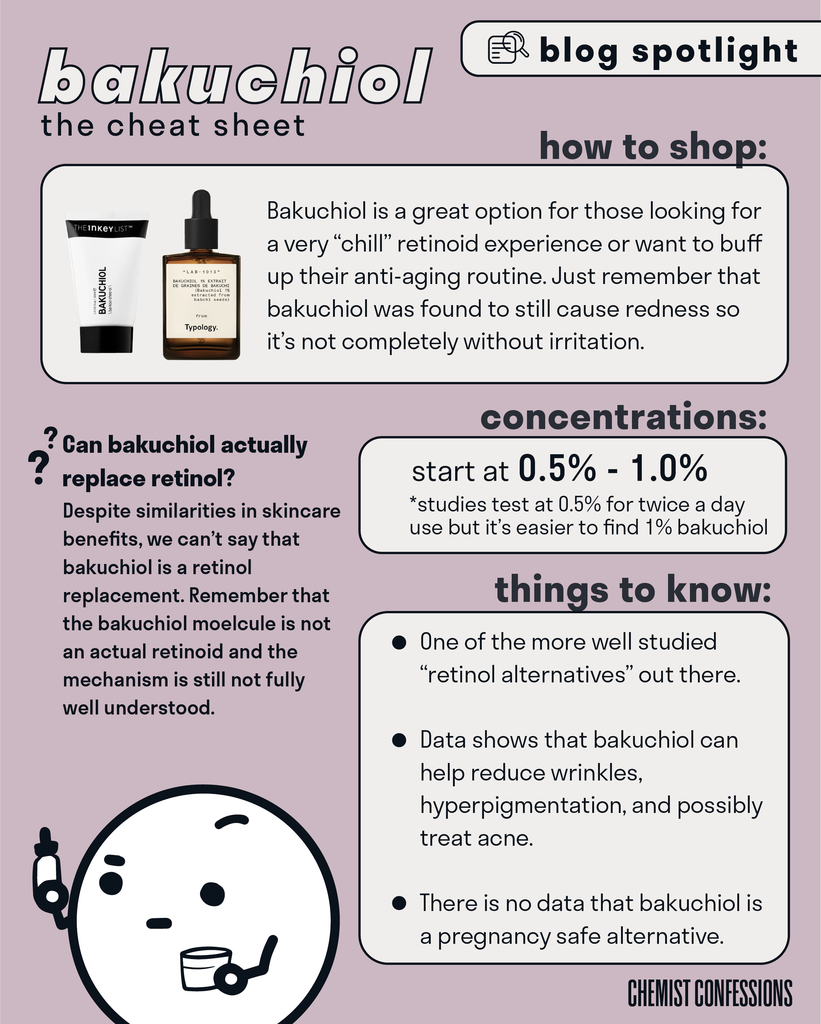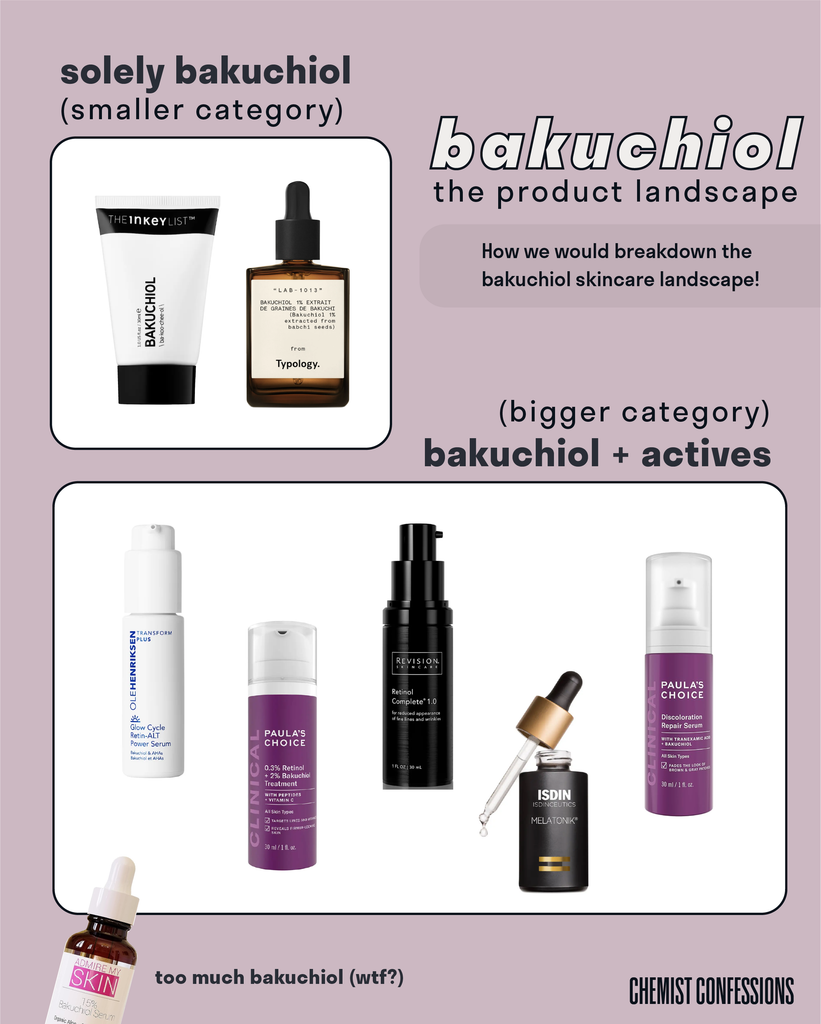Good old anti-aging retinol promises so many benefits. Yet for many (Gloria included!), it’s a temperamental little guy that can wreak havoc on your carefully maintained skin barrier. This means there are always new, buzzy ingredients promising the same glitz and glam of retinol without the snake molting, angry skin onboarding phase. One of the hottest ingredients in this category is bakuchiol, often marketed as “plant-based retinol alternative”. So! What does the science say? Can it ACTUALLY replace your beloved retinol serum? Or can you maybe combine the two and use bakuchiol with retinol?
If you’d rather get it in audio format, check out our podcast on YouTube or Spotify!
The Science Behind Bakuchiol (Ba-koo-chee-ol - how we say it *UPDATED)
Bakuchiol was first isolated and identified from the traditional Chinese/Indian medicine plant, babchi (Psoralea corylifolia), all the way back in the 60s. Fast forward to the early 2000s, bakuchiol had accumulated quite a testing profile, with in vitro studies showing that this molecule may have antimicrobial and anti-inflammatory benefits. Then finally in 2014, a study using substitute skin showed that bakuchiol seemed to have similar gene expression as retinol *gasp*!
But before going any further, we HAVE to remind everyone that bakuchiol is not a true retinoid. The structure is not in the same class as the retinoid molecules and you can see here is quite different:
This definitely put enough excitement behind bakuchiol to kick off several human clinical studies. One of the most notable studies on bakuchiol actually compares bakuchiol directly with retinol. In a double-blind, placebo-controlled study with 44 subjects (~20 per group), 0.5% bakuchiol was used twice daily and was tested in comparison to 0.5% retinol (used once daily) for 12 weeks. Bakuchiol showed similar results in areas such as wrinkle surface area and pigmentation. Retinol did outperform the bakuchiol group slightly, but the bakuchiol group had less irritation and flaking. We should also point out that subjects in this study still experienced as much redness from bakuchiol as the retinol group.
There are a few other studies that also looked at using bakuchiol for acne. It’s been studied in conjunction with both adapalene and salicylic acid. In these studies, bakuchiol combined with these other acne actives appeared to help reduce inflammatory lesions even better than when using the acne topicals alone.
To be honest, bakuchiol has actually been through quite the testing journey! We would say that studies on bakuchiol are much more robust than most of the other trendy plant stuff you hear about (*cough CBD). Are you considering trying out bakuchiol? Let’s go through some shopping and routine tips!
Shopping for bakuchiol

Before jumping on the bakuchiol bandwagon, here are a few things to keep in mind. Though it's fairly well-tested as a “retinol alternative”, bakuchiol isn’t exactly a certified cure-all to replace your current, beloved retinoid. So we’d say keep moving forward if you’re already using and loving the classic retinoids (ie. tretinoin, retinol, retinal).
While bakuchiol is positioned as a gentler alternative to retinol, it isn’t 100% vanilla either. In studies, it still causes some irritation, itching, and quite a bit of redness. So still proceed with caution and introduce slowly, especially if you have sensitive skin.
Still interested? Well. The bakuchiol products landscape is WILD. You’ll see… a lot of purple face oils, some bakuchiol + retinol combinations, and strangely high concentration products. Ironically, while pretty much all the studies use bakuchiol at 0.5%, most products on the market are either way below that or seem to be WAY higher than this. We would say a good basic starting point just to see if bakuchiol is right for your skin is a simple formula with 1% bakuchiol.
Bakuchiol Only Products to Try
The Inkey List Bakuchiol Moisturizer
Bakuchiol + Anti-Aging Actives Blend
Paula's Choice 0.3% Retinol + 2% Bakuchiol
Isdin Restorative Melatonin Night Serum
Revision Skincare Retinol Complete 1.0

Fun fact! Bakuchiol seems to keep being packaged in purple face oils because the babchi flower is purple. But we can assure you the ingredient itself is most definitely not purple. It’s a dull yellow.
Top 10 Burning Questions You Might Have About Bakuchiol
As polled by our community:
- Does it work? The data shows that if used twice a day for 12 weeks, it can help with reduce wrinkles and help reduce pigmentation.
- Does it help with acne? It seems that bakuchiol could help as a secondary active to adapalene and salicylic acid in reducing breakouts. We don’t recommend bakuchiol as a main or singular active to treat acne.
- How irritating is it to skin? Referring to the study discussed above, despite using bakuchiol twice a day vs. retinol once a day, bakuchiol users had significantly less irritation. However, users still experienced redness. So while better than retinol, not completely free of irritation potential.
- How similar is it to retinol? We wouldn’t say bakuchiol is even a cousin to retinol or the other retinoids. It’s simply an extract that might possibly interact with the retinoid receptor in skin, but like all mechanism studies this just isn’t that well understood. Hence why we consider bakuchiol a retinoid alternative but not a retinoid.
- Is it similar to retinol in terms of safety concerns for pregnant women? We don’t know...yet. Again, this is a better conversation to have with your doctor if you are considering bakuchiol.
- Can you use retinol and bakuchiol together? Yes…carefully! From first hand experience working with these two, the combination can surprisingly cause more irritation. Like all new products, patch test & take it slow to make sure skin is happy with the combination.
- What is the correct way to use it? This really depends on the product format. We’ve mainly seen bakuchiol in two forms: face oils or moisturizers/creams. For face oils use as a last step. For moisturizers use after your water based serums and before your face oil.
- What is the target concentration? Aim for 0.5% but we’ve had trouble finding this concentration. It’s either at a mysterious amount or way too high.
- Do you need sunscreen? To be honest, it hasn’t been well studied. Good sunscreen practices are always important anyways so no matter what, just keep that up!
Key Bakuchiol Takeaways
- Bakuchiol used at 0.5% twice daily performed similarly to 0.5% retinol once daily for wrinkle reduction and reducing hyperpigmentation.
- It pairs well with your other acne actives such as adapalene and salicylic acid!
- Still proceed caution - though generally speaking gentler than retinol, it’s far from being a side effects-free vanilla ingredient that some brands would like you to believe.
References & Further Reading
Dhaliwal, S., Rybak, I., Ellis, S.R., Notay, M., Trivedi, M., Burney, W., Vaughn, A.R., Nguyen, M., Reiter, P., Bosanac, S., Yan, H., Foolad, N. and Sivamani, R.K. (2019), Prospective, randomized, double-blind assessment of topical bakuchiol and retinol for facial photoageing. Br J Dermatol, 180: 289-296. https://doi.org/10.1111/bjd.16918




